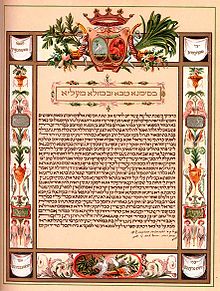


An 18th century Ketubah
| |
| Tractate of the Talmud | |
|---|---|
| Seder: | Nashim |
| Number of Mishnahs: | 111 |
| Chapters: | 13 |
| Babylonian Talmud pages: | 112 |
| Jerusalem Talmud pages: | 72 |
| Tosefta chapters: | 12 |
← Yevamot
Nedarim →
| |
Ketubot (Hebrew: כְּתוּבּוׂת) is a tractate of the Mishnah and the Talmud in the order of Nashim. It deals with a variety of marital responsibilities, especially those intended for the marital contract, also named the ketubah.[1] Due to the wide breadth of subjects discussed in this tractate, Ketubot is often referred to as the Shas katan (the miniature Talmud).[2]
A ketubah (plural: ketubot) (in Hebrew: כְּתוּבָּה; plural: כְּתוּבּוׂת) is a special type of Jewish prenuptial agreement. It is considered an integral part of a traditional Jewish marriage, and describes the groom's rights and responsibilities towards the bride. Currently, the ketubah does not have a monetary value, however, it has legal value in Israel.[3]
Due to the broad spectrum of topics covered in it, which include many subjects that are not directly related to married life, Masechet Ketubot is referred to by the rishonim as Shas katan (the Talmud in miniature) or mafte'ach ha-Shas (the index to the Talmud).
|
Marital life in Judaism
| ||
|---|---|---|
| Jewish wedding |
| |
| Prohibitions and Halakhot |
| |
| Women forbidden to their husbands |
| |
| Purity of a woman to her husband |
| |
| Jewish divorce |
| |
|
The Six Orders of the Mishnah (שִׁשָּׁה סִדְרֵי מִשְׁנָה)
| |
|---|---|
This article about a Judaism-related book or text is a stub. You can help Wikipedia by expanding it. |